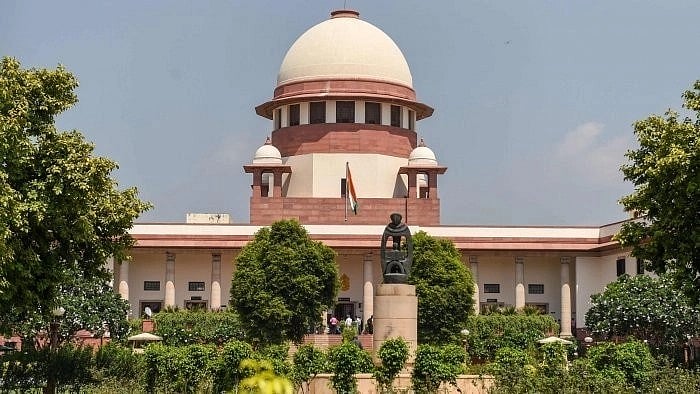
Supreme Court of India.
Credit: PTI File Photo
The Supreme Court has set free two men awarded death penalty and another person sentenced to life imprisonment in a case related to the kidnapping and murder of a 15-year-old boy of their neighbour in July 2013, highlighting the need for consistent and dependable code of investigation for the police.
A bench of Justices B R Gavai, J B Pardiwala and Sanjay Kumar found "shocking lapses, slipshod investigation'' and "dubious process" adopted by the police in the case based on circumstantial evidence.
The court allowed the appeals filed by Om Prakash Yadav, his borther Raja and son Rajesh alias Rakesh against the Madhya Pradesh High Court judgement which confirmed the trial court's findings and sentence against them. Om Prakash, a neighbour of the victim's family in a locality in Jabalpur was sentenced to life term and Raja and Rajesh were awarded the capital punishment for killing Ajit Pal after kidnapping him for ransom. The prosecution alleged the accused eyed the huge sum of money received by the victim's family after the sale of a house.
After hearing senior advocate Sidharth Luthra and advocate Supriya Juneja for the appellants, the court granted the three benefit of doubt due to "yawning infirmities and gaps in the chain of circumstantial evidence", after discarding the prosecution's bid to rely upon DNA analysis, recoveries and call details records. It also found even the original SIM card owner on whose number the ransom call was made not examined in the matter.
The court voiced deep and profound concern over the disappointing standards of police investigation that seems to be the invariable norm.
As long back as in the year 2003, the Report of Dr Justice V S Malimath’s ‘Committee on Reforms of Criminal Justice System’ had recorded their role in critical importance of the criminal justice system, the bench said.
It also pointed out the Law Commission of India's 239th report of March 2012 had observed that the principal causes of the low rate of conviction are due to inept, unscientific investigation by the police and lack of proper coordination between police and prosecution machinery.
"Despite passage of considerable time since these gloomy insights, we are dismayed to say that they remain sadly true even to this day," the bench said.
In the case, the bench said, the police tailored their investigation, with complete indifference to the essential norms in proceeding against the accused and in gathering evidence; leaving important leads unchecked and glossing over other leads that did not suit the story that they had conceived.
"It is high time, perhaps, that a consistent and dependable code of investigation is devised with a mandatory and detailed procedure for the police to implement and abide by during the course of their investigation so that the guilty do not walk free on technicalities, as they do in most cases in our country," the bench said.
In strong observations, the bench said it is indeed perplexing that, despite the innumerable weak links and loopholes in the prosecution’s case, the trial court as well as the High Court were not only inclined to accept the same at face value but went to the extent of imposing and sustaining capital punishment on Rajesh Yadav and Raja Yadav.
"No valid and acceptable reasons were put forth as to why this case qualified as the ‘rarest of rare cases’, warranting such drastic punishment. Per contra, we find that the yawning infirmities and gaps in the chain of circumstantial evidence in this case warrant acquittal of the appellants by giving them the benefit of doubt," the bench said.
